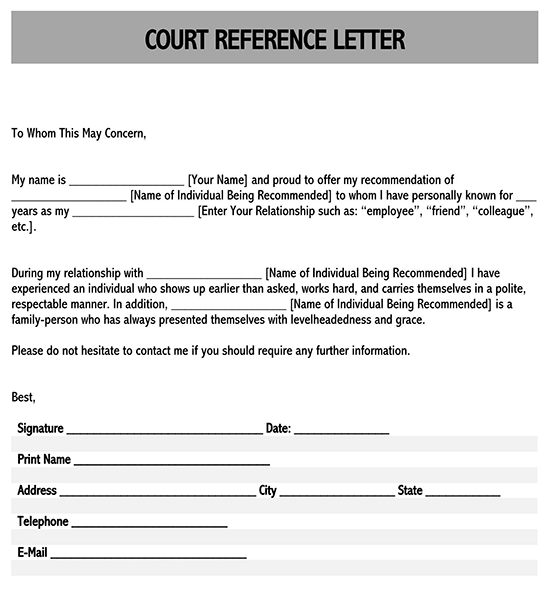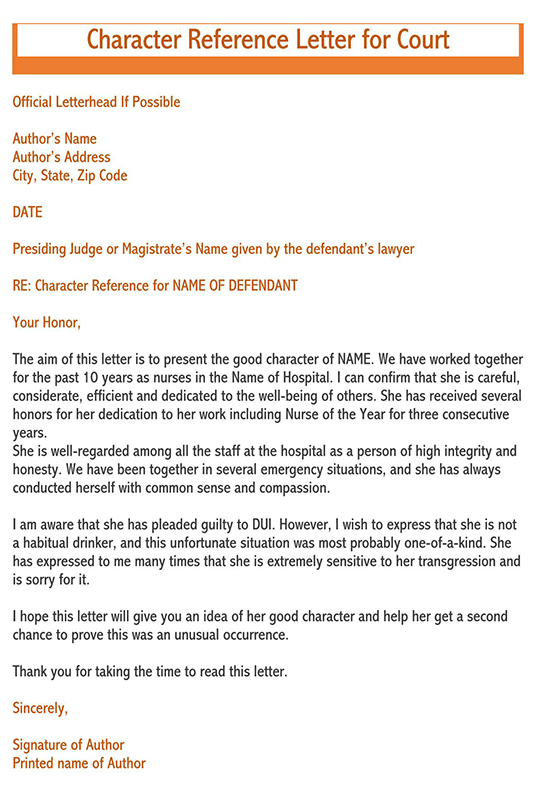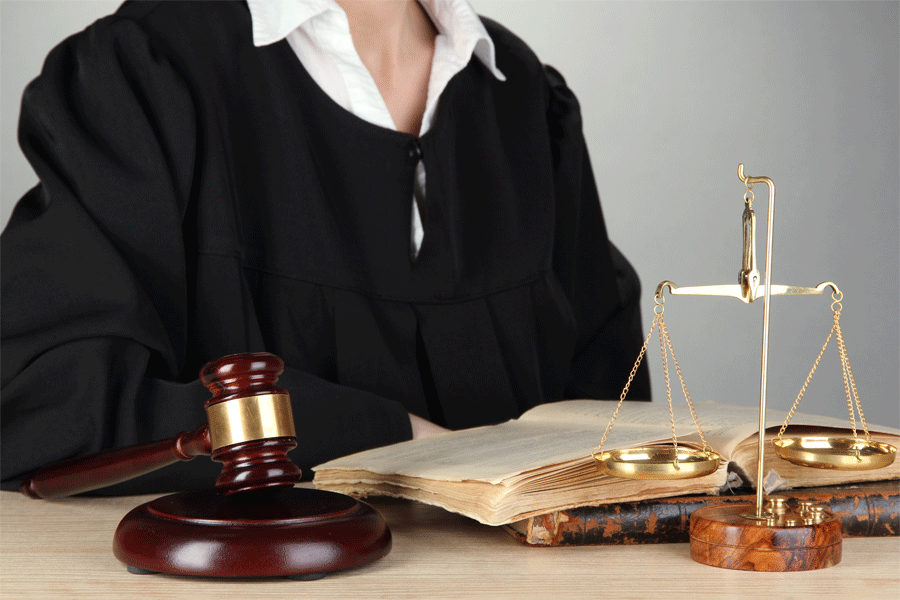Before a favorable judgment is arrived at, a presiding judge or magistrate will often want to know more about the accused’s reputation and personality. To provide this piece of information, a friend, relative, coworker, or associate of the accused will usually draft a written statement of the mental and moral qualities of that person. This letter is called the official character reference letter for court.
It is an official communiqué that is addressed to the presiding judge/magistrate whose aim is to let the said person know more about the offender. It may be written by a friend, coworker, member of the family, relative, or any other close associate of the offender.
Free Templates


Purpose of the Reference Letter in Legal Processing
- Character reference letters are instrumental in humanizing the defendant by providing a personal perspective beyond legal intricacies.
- They present a comprehensive view of the individual, allowing the court to perceive them beyond the confines of a case file.
- These letters offer valuable context for the defendant’s life, shedding light on their values and positive contributions to society.
- Contextual information becomes essential in influencing the court’s perception and decision-making process.
- Character reference letters play a pivotal role in balancing perspectives, offering a counterpoint to any negative information encountered during legal proceedings.
- They aim to showcase positive aspects of the defendant’s character, contributing to a more well-rounded understanding.
- Additionally, these letters allow for the highlighting of growth and change, providing evidence of rehabilitation, remorse, or a commitment to personal development.
- The potential impact of character reference letters on legal outcomes is significant, as they can positively influence sentencing decisions.
- Well-crafted letters showcase the defendant’s positive attributes and potential for rehabilitation, potentially leading to more lenient sentences.
- These letters may also contribute to mitigating penalties, especially when the court is deliberating the severity of punishment.
How to Write Character Reference for Court
While drafting a crucial document of this kind, there are things you have to uphold or bear in mind.
Also, you should follow a specific format for the job. Below is how you ought to set out properly explained:
Introduction – identify yourself
Start by identifying yourself and establishing a connection between the offender and you. Tell the magistrate or judge who you are, how related to the offender you are, how long and in what capacity you have known the offender, and why you feel qualified to draft this letter on behalf of the offender.
Main body – get to the core of the letter
This is now the core of the letter. It is here that you vouch for the positive attributes of the accused. Try and draft the letter in such a way as to sway the ruling in favor of the accused.
Below are some dos and don’ts:
Do’s
- Be courteous at all times
- Create a nice rapport with the judge and court officials
- Indicate that you are aware of the offense that the offender is accused of
- Include specific details of the character of the offender and how related to him you are
- Insist only on the positive aspects of the offender’s personality or character
- Specify whether this is a one-off accident or a repeat offense
- Explain some of the unfavorable things that might happen in the event that the offender is ultimately convicted
- Tailor the letter to the particular offender or incident
Don’ts
- Include details about previous offenses the offender may have committed.
- Suggest the penalties the offender ought to receive, in your opinion.
- Incorporate general statements about the offender (be specific and relevant to the topic of discussion).
- Lie to the presiding judge or magistrate as it is a criminal offense to deceive the court.
- Make irrelevant suggestions or speeches.
- Criticize the court, court officials, or the hearings in any shape or form.
Conclusion
Leave your contact information behind and roughly summarize the contents of the letter. State that you are prepared to offer any further pieces of information if need be. Make one last attempt to persuade the judge to clear the accused of the charges that have been brought against him.
Free Template for Character Reference Letter
[Your Full Name]
[Your Address]
[City, State, Zip Code]
[Your Email Address]
[Your Phone Number]
[Date]
The Honorable [Judge’s Full Name]
[Judge’s Title]
[Court Name]
[Court Address]
[City, State, Zip Code]
Re: Character Reference for [Defendant’s Full Name], Case No. [Case Number]
Dear Judge [Judge’s Last Name],
I am writing this letter to offer a character reference for [Defendant’s Full Name], who is due to appear before your court on [Date of Hearing]. My name is [Your Full Name], and I have been [Your Relationship to the Defendant, e.g., a close friend, employer, or colleague] for [Number of Years] years. My relationship with [Defendant’s Name] has given me insight into their character and personal values.
In my experience, [Defendant’s Name] has consistently demonstrated qualities such as [mention specific positive traits, like honesty, integrity, or compassion]. For instance, [provide a specific example that illustrates these traits, such as a situation where the defendant showed kindness or responsibility].
[Defendant’s Name] has been an active and positive presence in [his/her] community, contributing through [mention specific community involvement or support to the family, like volunteering at a local charity or helping family members in need].
I am aware of the charges against [Defendant’s Name] and understand the gravity of the situation. However, I have observed [his/her] response to these charges, which includes [mention any remorse expressed by the defendant, efforts towards rehabilitation, or changes in lifestyle].
Furthermore, [Defendant’s Name] has taken significant steps towards personal improvement, such as [list any rehabilitation programs, counseling, or community service the defendant has undertaken].
I believe that [Defendant’s Name] is genuinely [remorseful for their actions/dedicated to making positive changes]. Therefore, I respectfully request that you consider these aspects of [his/her] character when deliberating on [his/her] case.
Thank you for considering my perspective in this matter. If you require any further information, please feel free to contact me at [Your Contact Information].
Sincerely,
[Your Full Name]
[Your Signature, if sending a hard copy]
Sample Letters
We now look at two samples of these letters here below:
Drink Driving
Re: Character Reference for Laura Bennett, Case No. 2024DUI0987
Dear Judge Clark,
I am writing this letter in support of Laura Bennett, who is facing a drink driving charge and is due to appear in your court on February 10, 20XX. My name is Michael Anderson, and I have known Laura for over 10 years. We first met as colleagues at Franklin Design Studio, and our friendship has grown stronger over the years.
Laura has always demonstrated a strong sense of responsibility and compassion in both her professional and personal life. She has been a dedicated volunteer at the Austin Community Food Bank and has organized numerous fundraising events for local charities. Her commitment to helping others is a testament to her character.
When I learned of Laura’s drink driving charge, I was surprised and deeply concerned. This incident is not reflective of the Laura I know. She has expressed profound regret for her actions and understands the severity of the situation. Since the incident, Laura has enrolled in a responsible driving program and has been actively participating in alcohol awareness seminars. She is committed to learning from this mistake and ensuring it is not repeated.
Laura is genuinely remorseful and has taken full responsibility for her actions. She has assured me and others that she is dedicated to making positive changes in her life. Her proactive approach to addressing this issue is commendable and shows her willingness to learn and grow from this experience.
I respectfully request that you consider Laura’s positive contributions to our community and her sincere efforts to rectify her mistake when making your decision. I believe that she deserves the opportunity to learn from this incident and continue her positive impact on our community.
Thank you for considering my perspective on this matter. If you require any further information, please feel free to contact me.
Sincerely,
Michael Anderson
[Signature, if sending a hard copy]
Assault Offense
Re: Character Reference for Emily Rodriguez, Case No. 2024ASSLT456
Dear Judge Thompson,
I am writing to you regarding Emily Rodriguez, who is currently facing assault charges and is scheduled to appear in your court on February 15, 20XX. My name is Jacob Harris, and I have been Emily’s neighbor and friend for over 12 years, residing next door to her on Oak Lane.
Throughout the years, I have known Emily to be a caring and involved member of our community. She has been instrumental in organizing neighborhood events, such as the annual block party and the neighborhood watch program. Her efforts have always been directed towards creating a safe and welcoming environment for all residents.
I was shocked to hear about the charges against Emily. This behavior seems out of character for her, based on my longstanding acquaintance. Emily has always been someone who resolves conflicts through dialogue and has been a mediator in various community disagreements.
Since the incident, Emily has expressed her deep regret and has been actively seeking ways to make amends. She has enrolled in anger management classes and has been volunteering at the local community center to mentor atrisk youth. These actions, in my view, demonstrate her commitment to personal growth and her understanding of the seriousness of the situation.
Emily has been a pillar in our community, known for her kindness and willingness to help others. I believe that the incident leading to these charges does not define her character. She has shown genuine remorse and is taking concrete steps to ensure such an incident does not occur again.
I respectfully ask that you consider Emily’s past contributions to our community and her proactive efforts to address this situation when deliberating on her case. I am confident that she is dedicated to learning from this experience and continuing her positive impact on our neighborhood.
Thank you for considering my perspective on Emily Rodriguez’s character. Should you require any further information, please do not hesitate to contact me.
Sincerely,
Jacob Harris
[Signature, if sending a hard copy]
Conclusion
In conclusion, character reference letters play a crucial role in legal proceedings by offering a deeper understanding of an individual’s character, behavior, and overall personality. this article delves into why these letters matter in court and highlights their significance in presenting a more comprehensive view of the defendant. To make the process easier for you, free templates and sample letters are provided to assist you in crafting a reference letter that is both accessible and straightforward. Remember, when writing these letters, sincerity and honesty are key, focusing on the positive attributes of the individual.
While these letters can carry weight, it’s important to recognize that the court will ultimately assess their impact within the broader context of the case. As with any legal matter, seek professional advice and adhere to the guidelines established by the legal system. The idea behind providing templates and examples is to give you the tools you need to write a compelling and well-rounded character reference letter. This, in turn, contributes to a fair and just consideration of these references in legal proceedings, aiding the court in making informed decisions aligned with the principles of justice and equity.












